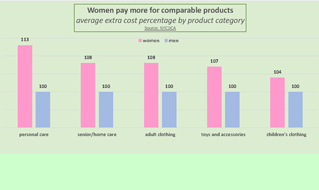Tag Archives: Deceptive
FTC sues Live Nation and Ticketmaster alleging illegal resale tactics

The FTC estimates that Ticketmaster has charged $3.7 billion in fees on resale tickets from 2019 through 2024. By Isabella Gomez Sarmiento. Read the full story here.
SB 648: Regulating Residential Care Referral Agencies

As the least-regulated long-term care facilities, RCFEs are easy targets for greedy referral agencies seeking to dump seniors in under-supervised environments. Some 7,800 RCFEs operate in California now, with roughly 175,000 beds available, and their numbers are expected to grow as the ranks of the elderly swell. Read More ›
Judge Shreds Uber; Says Company Can’t Prove Riders Are Giving Up Right To Sue
by Chris Morran, Consumerist

With regard to the Uber app, [U.S. District Court Judge Ned] Rakoff notes that there is no requirement for the new user to even check off a box that they read the terms of service; one could easily finalize their registration without reading, or even knowing about, these terms — let alone the restrictive arbitration clause. Read More ›
Fitbit Must Face Lawsuit Over Sleep-Tracking Claims
by Chris Morran, Consumerist

Fitbit also contended that the marketing claims are just “puffery,” meaning general statements of superiority that can’t be taken as false advertising. Yet the judge found this argument unconvincing. Read More ›
Former Corinthian College Students Sue To Have Private Loans Discharged
by Ashlee Kieler, Consumerist

The lawsuit, filed in Los Angeles, against Turnstile Capital Management, LLC, Balboa Student Loan Trust, and University Accounting Service, LLC seeks to provide California students defrauded by the for-profit college chain with full debt relief. Read More ›
Pink Tax Repeal Act Aims To Make Pricing Fair To Women
by Carla Fried, Consumer Reports

Last Friday, Congresswoman Jackie Speier (D-CA) aimed to put an end to pricing products according to gender. She introduced the Pink Tax Repeal Act—a bill that would prohibit companies from charging different prices for similar products or services simply based on the gender of the customer. …
“As a rule, the man’s version or a neutrally-branded product is going to be less costly than the womens or girls version,” says Richard Holober, executive director of the Consumer Federation of California. “Consider buying products that aren’t specifically labeled for the use of women.” Read More ›
AB 2688: Health ‘Privacy’ Bill Would Unleash Information Sharing

6/28 update: AB 2688 was approved in the Senate Judiciary Committee today. Voting in favor of the bill – and against consumers’ interests – were all of the panel’s Democrats: Chair Hannah-Beth Jackson and Senators Robert Hertzberg, Mark Leno, William Monning and Bob Wieckowski. The committee’s two Republicans, Vice … Read More ›
Is Your Set-Top Box Telling Advertisers What You Watch?
by David Lazarus, Los Angeles Times

“They’re hiding the ball,” said Dallas Harris, a policy fellow with the advocacy group Public Knowledge who co-wrote the complaints [to the FCC and FTC]. “They say in their privacy policies that they may collect data on you and they may use it for marketing. They know that’s what they’re doing. So there’s a big disconnect between what they say and what’s actually happening.” Read More ›
Call Kurtis: Why You May Not Want To Say A Word During An Unexpected Call

In 2014 the Federal Communications Commission fined Central Telecom Long Distance $3.9 million, “For unjust, unreasonable and deceptive practices.” In one woman’s FCC complaint, she says the company took a recording of her answering “yes” to another question and copied it multiple times on the playback, which ultimately changed her preferred long distance telephone carrier without her authorization. “It’s definitely not honest, and a little shady, absolutely,” said Danielle Spang with the BBB. Read More ›
Women’s Products That Cost More Than Men’s? It’s Called The ‘Pink Tax’, And Not Everyone’s Mad
by Teri Sforza, Orange County Register

Richard Holober, executive director of the Consumer Federation, said with exasperation that a Levi’s One Pocket Boyfriend Shirt has been marketed to women for $78. Their boyfriends, he said, could buy a nearly identical shirt for $48. “Add the word ‘boyfriend’ and put the shirt on a woman, and the price goes up by $30,” Holober said. “Businesses have figured out, through a lot of research, how to extract extra dollars by giving products a veneer of being designed especially for girls or women. But that’s not right.” Read More ›
Gender Pay Gap Includes Product Pricing
by Gabrielle Karol, ABC10, Sacramento

The Consumer Federation of California sponsored [SB 899], which was authored by State Senator Ben Hueso (D-San Diego). The bill’s motivation is a December report from New York’s Department of Consumer Affairs. In the report, nearly 800 products are compared at two dozen different retailers. Forty-two percent of the time, women’s products are priced higher than men’s products. The so-called “pink tax” means shoppers are paying an average seven percent more for items targeted to women. Read More ›
Uber Agrees To Settle DA Suits Over Safety Practices
by Jason Doiy, The Recorder

Uber Technologies Inc. will pay up to $25 million to settle a lawsuit brought by the San Francisco and Los Angeles district attorneys’ offices over how it has touted safety measures. … Uber agreed to change the way it describes its driver checks and safety practices and to cooperate with the Division of Measurement Standards to certify that ride charges are accurate and fair. [The complaint claimed] the San Francisco-based ride-hailing company misled consumers by advertising the “safest rides on the road,” coupled with “industry leading background checks.” Read More ›
CFC Sponsors SB 899 (Hueso) To End Gender Bias In Retail Prices

6/30 update: Senator Ben Hueso (D-San Diego) dropped SB 899 today after it became apparent that a majority of the Assembly Judiciary Committee would not support the bill unless he accepted amendments proposed by the committee’s leadership that would have eviscerated the bill. Women shouldn’t be charged … Read More ›